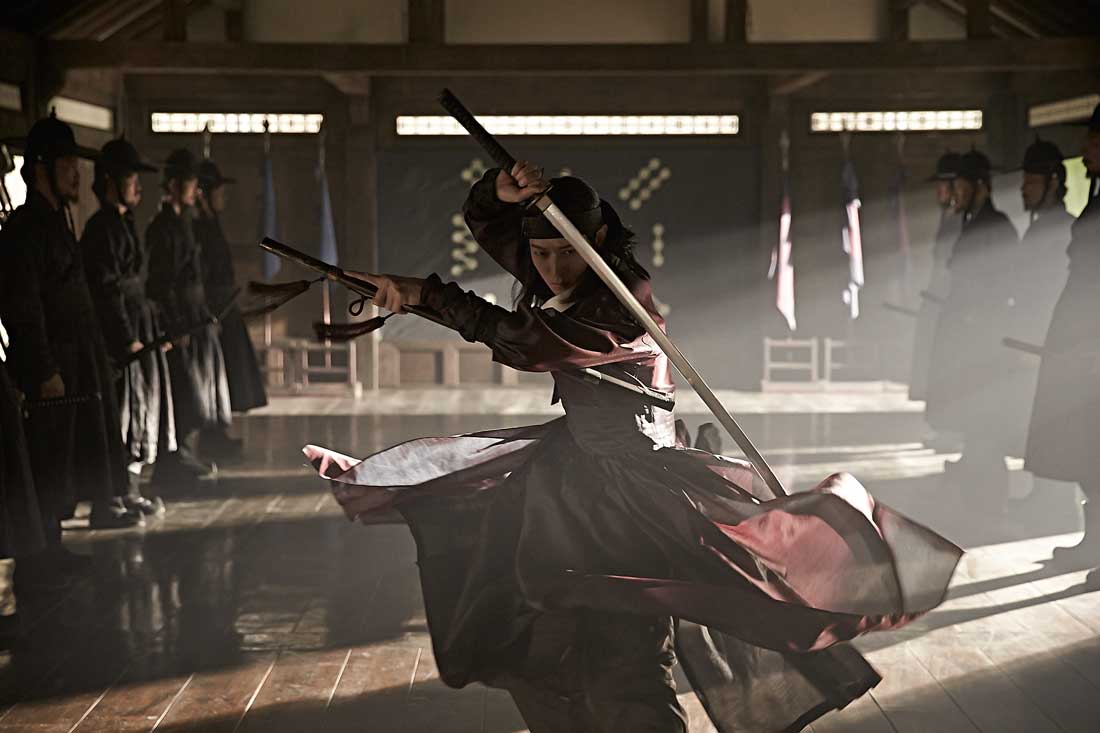It’s the end of August, and the movie distributors are busy depositing all their odd entries in the smaller auditoriums at the AMC Grapevine Mills. So I’ve put together this handy guide to help you sort through this esoteric smorgasbord should you find yourself at the multiplex this weekend.
While the theater is still playing The Admiral: Roaring Currents, it’s bringing in another historical epic this week for the Korean-speaking crowds to sink their teeth into. Kundo: Age of the Rampant was also a huge hit in its native country, breaking South Korea’s record for biggest-ever opening weekend, before Roaring Currents shattered its mark a few weeks later. Sadly, Kundo doesn’t turn out to be nearly as solid a piece of entertainment.
The main character is Dolmuchi (Ha Jung-woo), a lowly butcher in the kingdom of Joseon in 1862 who’s enlisted for a dirty job on behalf of Prince Jo-yoon (Kang Dong-won), the king’s bastard son. Having already murdered his legitimate younger brother to maintain political power, the psychopathic Jo-yoon now wants his sister-in-law Gok-ji (Han Ye-ri) dead before she gives birth to a baby who might challenge him as the king’s heir. When Dolmuchi can’t bring himself to slit a pregnant woman’s throat, royal soldiers burn down his house and kill his family. Left for dead, the butcher falls in with a band of outlaws who steal rice from corrupt nobles and give it back to the people. The butcher trains ruthlessly, becomes a skilled warrior with two blades fashioned to resemble meat cleavers, rechristens himself as Do-chi, and vows to protect Gok-ji’s life and that of her baby.
Weighing down the storytelling are gobs of voiceover narration for the benefit of viewers who aren’t versed in Korean history. Amid this, the lords and officials are cartoons of greedy, venal nobility, while Jo-yoon hangs a bunch of children in public for stealing rice, just to show the people how evil he is. That aside, the character’s motivations are stolen straight from Joaquin Phoenix’s Commodus in Gladiator. Director Yun Jong-bin cribs his techniques from Quentin Tarantino’s Django Unchained, replete with the same whip pans and zooms to close-up, while composer Jo Yeong-wook obliges him with a spaghetti Western-style score. Needless to say, Yun doesn’t have Tarantino’s imagination or his skill with action.
Despite the role’s limitations, the bad guy is the best thing here. Kang previously starred in the contemporary spy thriller Secret Reunion, which played here a few years back. The terribly good-looking Kang makes a vivid impression as an administrator whose rapacity is intended to please his dad but who takes a sick pleasure in it for its own sake. He’s also a lithe fighting presence who makes you believe that Jo-yoon could walk into an ambush and take down a dozen killers without so much as a scratch. This actor’s malevolence leaves the biggest impression from Kundo.
The star of The Prince could take a few lessons from Kang Dong-won. Jason Patric stars as Paul, a Mississippi auto mechanic who’s hiding his past as a feared New Orleans hit man known as “The Prince” and who fled the city after his car bomb intended for mob boss Omar Kaiser (Bruce Willis) instead blew up Omar’s wife and young daughter. When Paul’s college-student daughter Beth (Gia Mantegna) disappears into the Crescent City with a drug kingpin (50 Cent) feeding her heroin habit, Paul returns to New Orleans, knowing that doing so will incur Omar’s vengeance.
Moviegoers with long memories may recall that Patric was tipped for great things in the 1990s after his lead performances in After Dark, My Sweet and Rush (the 1991 drug addiction movie, not the auto racing movie from last year). Now 48, Patric is as lean and fit a screen presence as ever. He’s also as boring as ever, projecting the same one-note intensity regardless of the situation and delivering all his lines in the same would-be menacing undertone.
Director Brian A Miller (apparently there’s no period after the “A”) finds nothing new in the New Orleans location, which by now has served as a backdrop for so many movies that it’s played out. Beth’s massively annoying college friend (Jessica Lowndes) tags along with Paul long after she’s fulfilled any purpose in the plot. The movie tells us endlessly how scary The Prince was back in his day, and we just don’t see any of that on the screen, despite many opportunities. Even the character’s moniker is underwhelming — seriously, “The Prince” was the most badass nickname anybody could think of?
To top it all off, the action is undistinguished. We’re primed to expect a royal smackdown between Paul and Omar’s main henchman (played by Korean pop music star Rain), and instead the fight is a damp squib. John Cusack is all-too-typically glum as The Prince’s old running mate gone legit. The only real energy comes from Willis, specifically during the climactic shootout as Omar threatens to kill Beth in retribution. Nice to see this from an actor who has sleepwalked through many a thriller similar to this one, but it comes far too late to give any meaningful distinction to this lackluster pulp thriller.
As counterprogramming to the machismo of the preceding films, there’s Another Me, a female-centric psychological thriller that wants to be Black Swan so bad, it’s really kinda cute.
Sophie Turner from TV’s Game of Thrones plays Fay, a Welsh high-school girl who has just been cast as Lady Macbeth in her school play. The play would seem to fit Fay’s mood, which has spiraled downward ever since her dad (Rhys Ifans) started deteriorating quickly from multiple sclerosis. She starts to have visions of another girl who looks like her, while friends and neighbors swear that they’ve seen her in places where she hasn’t been. Is an evil spirit stalking her from the afterlife? Is she suffering paranoid hallucinations? Or is it just her classmate (Charlotte Vega), a spiteful loser who happens to have long, red hair similar to Fay’s? So convinced is Fay that her doppelganger is real that she slices open her hand in the principal’s office to differentiate herself from her double.
The movie is based on a novel by Cathy MacPhail that I haven’t had the chance to read. I wish I had, because it might give me a clue to what the hell happens at the end. I’m told that the book raises questions as to whether we can trust Fay as a narrator and deals with themes of identity and teenage angst. If so, Catalan writer-director Isabel Coixet makes hash out of them. Worse, she doesn’t deliver any scares. Lacking any experience in horror films, she has no flair for the genre, and all she can conjure up are scenes of Fay walking through deserted locations that have no reason to be deserted, while cracks appear on the many mirrored surfaces around her. Coixet tries to use the double like a long-haired Japanese ghost (think of the evil spirits in either version of The Ring), but that tactic doesn’t work, either. I can’t help thinking that a Japanese director would have brought some style to this that would have lessened the need for the story to make sense.
Fay makes a traumatizing discovery about her mom (Claire Forlani) that dredges up some promising story material. Coixet squanders that promise, being unable to make this revelation dovetail with the horror. The same goes for the production of Macbeth and Fay’s performances in the play. Fay’s dad’s explanation for what the double is turns out to be downright laughable, too. All the unintentional silliness winds up sinking a talented cast, including Pan’s Labyrinth star Ivana Baquero, grown up and blending in seamlessly with the Brits around her as one of Fay’s friends. If this is how summer at the movies ends, all I can say is “Bring on the fall.”












